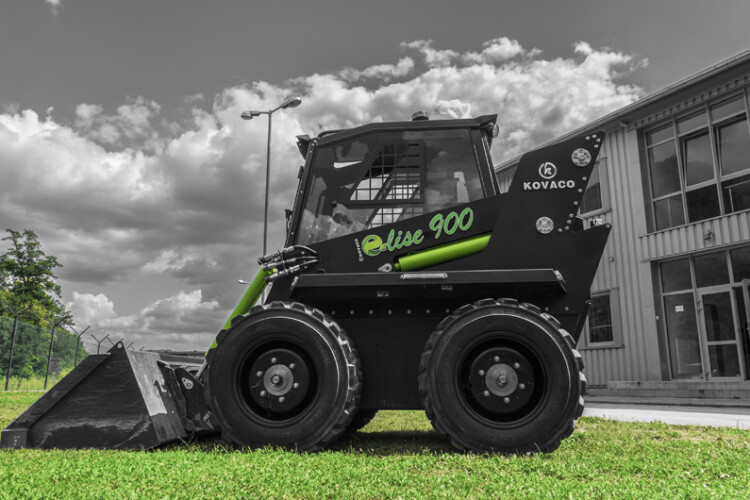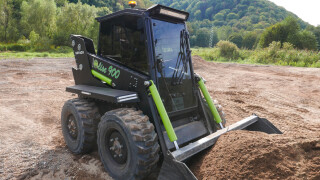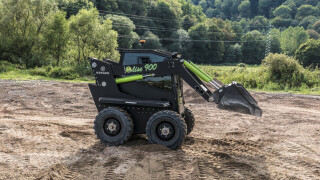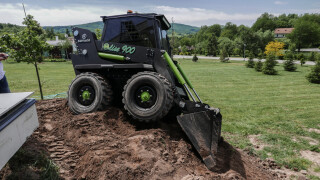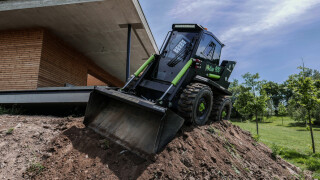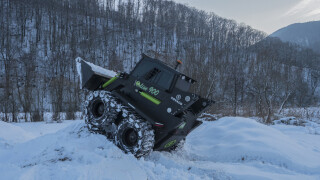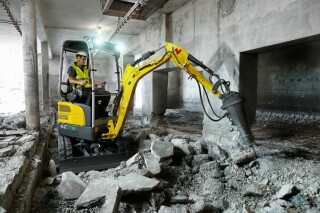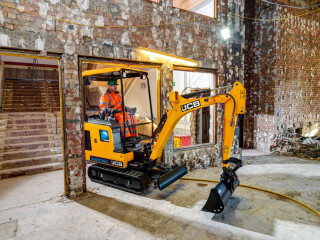For many in the industry, construction plant and diesel power are inseparable. But we all know that the quest for low-carbon options is leading inexorably towards battery power – it’s just a matter of time.
Hybrid machines have been available for many years and, indeed, electric draglines were working in opencast mines many decades ago. But the widespread use of true all-electric battery power in general construction plant has yet to become a reality.
A significant step forward was taken in 2015 when Czech manufacturer Kovaco developed a completely battery-powered skidsteer, launching it on the domestic market in 2018.
That machine – the Elise 900 – has now arrived in the UK via agents Paul and Finlay Bassett. The father-and-son team are now networking frantically to help Kovaco establish a network of UK dealers and according to Finlay (the younger Bassett) the biggest challenge is keeping abreast of enquiries.
This article was first published in the Oct/Nov 2020 issue of The Construction Index magazine. Sign up online.
“I’ve never had a product that has generated as much interest as this,” says Bassett. “It really has captured a lot of people’s imaginations. A lot of companies, obviously, are looking at the green ticket and at the moment we’re in a unique position as ours is the only [all-electric] one on the market,” he says.
The Elise 900 looks very much like any other skidsteer: it has an operating weight of just over three tonnes and a load capacity of 900kg. A more powerful version, fitted with a larger battery, is also available with a lifting capacity of 1.4 tonnes.
Prague-based Kovaco is not a familiar name in the world of construction equipment. According to Bassett, the company has a background in heavy engineering, “but how the skidsteer came about I’m not exactly sure – though I can tell you that it was developed in 2015 and they’ve had five years of telematic data and snagging to make sure they’ve got it right.”
The Bassetts started working with Kovaco in early March 2020 and were all set to roll the product out to the UK market when the Covid-19 lockdown threw a spanner in the works. “The owners were due to come over for meetings and I was all set to visit the factory for training when Covid struck,” says Finlay Bassett.
“So we decided we had to take this steadily and delayed the launch until the end of July,” he adds.
Nevertheless, a demonstration model had already been shipped to the UK and was being appraised by an equipment dealer in the Midlands who was able to tease interest locally by giving selected clients a sneak preview. “So we generated a bit of covert interest in the run up to the launch,” says Bassett.
When news leaked out to the press and stories appeared in a couple of agricultural publications, the response came as a surprise to Bassett: “Proper journalists don’t much like putting telephone numbers in their editorial, for good reason,” he observes. “But I’ve had people go to great lengths to find me or my father – and I know those enquiries I’ve taken are serious because of the effort they’ve made to contact us.”
Since the official launch the enquiries have increased enormously, says Bassett, whose background is almost entirely in agricultural machinery.
Speaking to The Construction Index one lunchtime in mid-September, he says: “If I tell you that my phone started ringing at a quarter to seven this morning and I’ve been on it solidly ever since, you get an idea of the level of interest.
“Enquiries are genuinely spread across all of industry. In agriculture, the usual suspects are pig and poultry farmers, dairy men who muck out with skidsteers. I had someone in the marine sector who was very interested in the fact the machine’s carbon-neutral.
“I’ve been speaking to several dealers who supply into ABP [Associated British Ports] and suchlike and they’re terribly interested because traditionally you crane a skidsteer into the hold of a ship and sweep it out. And with our machine there’s no heat, no emissions, no noise,” continues Bassett.
Other potential users, from equestrian centres to power stations have been showing an interest in Kovaco’s all-electric machine since its launch in July. “If you’d told me in March this year I’d be speaking to potential customers in power stations I’d have laughed,” he admits.
Given the apparent level of interest being shown in this machine, it seems odd that nobody bothered to develop an all-electric, battery-powered skidsteer before now. Well, in fact somebody has: seven years ago electric vehicle supplier ePowerTrucks introduced a small walk-behind skidsteer made in the Netherlands by Hanenberg Materieel.
This machine, marketed in the UK as the Sherpa, can lift a load of 110kg to a height of 2.5m and can carry up to 175kg with the loader arm lowered. Attachments include pallet forks, a brick carrier and various types of bucket.
Bassett says he’s familiar with the Sherpa, “but it’s not what I would call an archetypal skidsteer loader. It is a skidsteer, it is a loader, but it’s a walk-behind. In fact we do have something similar to that, called the Mini Z, but the Elise is at the other end of the market.
Though it pains him to utter the name of a rival, Bassett explains: “When you say ‘skidsteer’ most people think ‘Bobcat’ and that’s the market we’re in. The Sherpa’s not a competitor for the Elise,” he concludes.
Most of the leading manufacturers have been working on battery-powered additions to their product ranges and some – notably JCB and Wacker Neuson – have successfully launched battery-powered mini-excavators on the commercial market. But when it comes to skidsteers, Kovaco seems to be leading the charge.
Even more surprising is that, while most recent developments in battery power are focused on compact, powerful lithium-ion technology, Kovaco’s Elise 900 is powered by a good old-fashioned lead-acid battery – just like the milk-floats of yore.
Bassett’s explanation for this is two-fold: firstly, he says “the technology around lithium batteries is not quite there yet,” a statement that might raise eyebrows at Tesla, BMW, Nissan et al. “I can offer a lithium battery, but there’s the extra expense, of course,” he adds.

“Lead-acid is tried and tested. And don’t forget that in order to lift you need ballast and a lead-acid battery affords that ballast. It’s also very easy to maintain,” concludes Bassett.
It’s a logical argument. The weight and bulk of a traditional lead-acid battery just doesn’t make sense in a road car; but in a small, compact skidsteer loader, which needs plenty of mass and torque, having several hundred kilogrammes of lead on board is a positive advantage.
The Elise 900 can operate for up to eight hours on a single charge and, depending on the local supply, can be fully recharged within six to eight hours – or, in practical terms, overnight. If eight hours’ work seems a bit limiting, Bassett points out that, with an electric machine there’s no idling: when you’re not actually working, you’re not draining the battery. “And to use a machine for eight hours non-stop is highly unlikely,” he adds.
Battery usage can also be optimised thanks to the machine’s intelligent operating system. Each machine comes with a mobile phone that docks with the dashboard and communicates with the machine via Bluetooth. The Kovaco mobile phone app is simply downloaded from the internet. The phone can be used as a remote controller, but in most cases it will be plugged into the dashboard and the operator will control the machine in the conventional way using two joysticks.
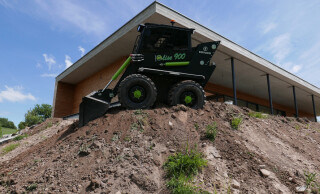
The phone has a battery charge indicator that tells you exactly how much power you’re using – “so if you engage forward speed on full power, it’ll light up red; disengage it and it goes green. This allows you to tailor your operation to save battery life,” says Bassett.
The Elise 900 has three on-board motors providing tractive force and powering the front loader via a hydraulic pump. Kovaco has produced an array of attachments especially for the machine, some hydraulic but most of them electric. Less energy is consumed when electric motors are used directly, rather than via a hydraulic circuit.
Bassett is keen to stress that he and his father Paul are not importers, nor are they distributors: their task is to act as Kovaco’s agents to establish a network of dealers in the UK.
The first of these, appointed in late August, is Heming Engineering, a tractor repair specialist located in the Cotswolds. Heming now represents Kovaco in a territory encompassing Warwickshire, Worcestershire, Gloucestershire, Herefordshire and Oxfordshire.
Heming Group’s managing director Peter Heming says that the Kovaco machine gives you “all the performance of diesel vehicles without emissions and noise.
“As there are only electrical motors in the machine service costs are set to a minimum, while operational cost savings compared to a conventional loader are dramatic and should pay for the machine within the first years of operation,” he adds.
Though brimming with enthusiasm for the product, Bassett is less than voluble when quizzed about prices. He won’t give a figure, though he concedes that the Elise 900 will cost more than a comparable diesel-powered skidsteer: “It’s very difficult to say; it depends on the dealer, depends on the manufacturer – depends on the day”. Instead, he prefers to focus on the economies of electric power – namely reduced maintenance costs and lower running costs. And he points out that some of his potential buyers, such as farms, process plants and power stations, have their own on-site renewable energy plants with which to charge the Elise’s battery.
Although at the time of writing Kovaco had no sales confirmed in the UK, Bassett says that sales enquiries to date have far exceeded what he had planned for. “The level of interest frankly caught me off-guard,” he admits. “But I now have a few dealers lined up and we just have to dot the i’s and cross the t’s. By the end of the year, we’re looking to complete the sale of up to 25 machines.
“My expectations change every day,” admits Bassett. “But I can see no reason why we shouldn’t soon hold a very large share of the skidsteer market in the UK.”
This article was first published in the Oct/Nov 2020 issue of The Construction Index magazine. Sign up online.
Although Kovaco claims to have developed the world’s first battery-powered skidsteer, it’s only a matter of time before other manufacturers join the fray. In fact, it’s hard to name any leading producer that isn’t investing heavily in battery technology:
• Takeuchi launched its prototype e240 mini-excavator, a battery-powered version of its four-tonne diesel-powered TB240, in 2017.
• Wacker Neuson launched its all-electric EZ17e and EZ26e mini excavators two years ago. The firm already had battery-powered rammers, wheeled loaders, vibratory compactors and a tracked loader in its product range.
• Hyundai Construction Equipment and engine producer Cummins exhibited an electric-powered 3.5-tonne mini excavator prototype powered by Cummins’ BM4.4E flexible battery modules at Bauma 2019.
• Eurocomach, part of the Italian Sampierana group, showed its all-electric ES12X (1.2 tonne) mini excavator in concept form at Intermat 2018 in France.
• Caterpillar also unveiled a concept compact wheeled loader powered by a fast-charging 41kW lithium-ion battery at Bauma last year.
• Also at Bauma 2019, Komatsu unveiled a pre-launch electric mini excavator based on the technology used in its hybrid construction equipment and electric forklift trucks.
• Bobcat began production of its E10e one-tonne electric micro-excavator at its factory in the Czech Republic in July 2019. The zero-tailswing E10e is built on the same platform and produced on the same production line as the diesel-powered E08 and E10z mini-excavators.
• In September 2019 JCB announced that its battery-powered 19C-1E excavator, launched that February, had gone into full production and that more than 50 units had already been delivered to dealers.
• Volvo Construction Equipment launched a brace of battery-powered machines (a mini excavator and a compact loader) at Bauma 2019. It has committed to replacing its entire range of compact excavators and loaders with all-electric battery models, stopping new diesel engine-based development of these models.
Got a story? Email news@theconstructionindex.co.uk

